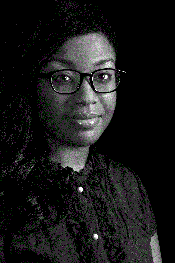#siege of shadows
By Sarah Raughley

You know, it’s always cool to read letters from fans of the Effigies series who really appreciate the fact that the titular Effigies are from a racially diverse background—Maia being of mixed Jamaican—American descent, Chae Rin being Korean Canadian, Lake being Nigerian-British and Belle being French. For me it was very important to have the Effigies be as global as the story. This is a world, after all, where any girl in the world could potentially become an Effigy. It wouldn’t make sense, then, for the characters to be an all-white band. When I’m able to do events with kids in the community, for example A Room of Your Own in Toronto where I talked with girls of color at the public library, it’s just phenomenal to see with your own beady little authorly eyes just how important writing diversity is.
And it’s weird because I’ve been told so many times by certain people that there must be a point to the diversity in your book, which I think for them means that your characters’ non-whiteness must be the crux of the story, the world building and/or the characters’ own personal arc. My personal approach to racial diversity is a little different. Of course, our backgrounds inflect who we are in many ways and gives us experiences that others may not have had. However, for my characters, rather than thinking of them as Korean first, or black first, or white first, I think of them as characters first. That means understanding that despite what differences we may have depending on what our ethnicity or nationality is, what makes us human is fundamentally the same. We are all driven by feelings, fears and desires that shape who we are as people. The fact, for example, that I’m Nigerian Canadian doesn’t mean that I somehow respond radically different than someone else when I am in pain or confused or scared for my life, nor does it mean that I’ll react exactly like another Nigerian or Nigerian Canadian would. Certainly, there are cultural behaviors that are learned when you grow up in certain cultural environments, but ultimately, the simple fact of one’s racial makeup cannot be the determining factor of how we act and who we are. Though some would want you to think otherwise, we as human beings have far more in common with each other than with any other species; certainly, regardless of our skin tone or nationality, we have far more similarities than differences.
For me, writing diversity means understanding that cultures and ethnicities are not a monolith. I am not like every other Nigerian or every other Nigerian Canadian or every other diasporic Nigerian living on this planet. I have my own personality, my own presence, my own voice (fun fact, I’ve been told over the phone that I sound like a white girl, which is a lot to unpack) based on how and where I grew up, based on my experiences, and everything else that goes into making someone an individual. If human beings can’t be pigeonholed into certain molds of personality, voice, and behavior based on their ethnic makeup, then neither can (and neither should) characters.
So while diversity is important, one crucial aspect of diversity in books is not approaching it with stereotypical, preconceived notions for how certain characters of a certain race are supposed to act, sound etc. In Fate of Flames and Siege of Shadows, the ethnicities and nationalities of the characters are part of who they are; but as a reader, what you’ll see before their ethnicity is what I always intended for you to see:
Their humanity.

Sarah Raughley grew up in Southern Ontario writing stories about freakish little girls with powers because she secretly wanted to be one. She is a huge fangirl of anything from manga to SF/F TV to Japanese role playing games. On top of being a YA writer, Sarah has a PhD in English, which makes her doctor, so it turns out she didn’t have to go to medical school after all.
Siege of Shadows is available for purchase.
